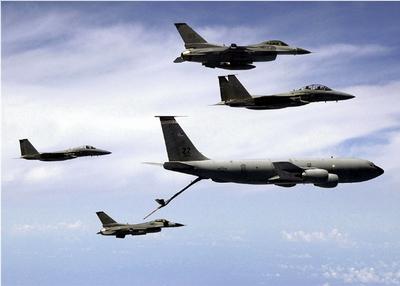...or Is It Corporate Welfare, ask Groups
Seven independent taxpayer-advocate and anti-war groups
wrote several congressional keys this week, after they examined
last month's announcement by the Pentagon to lease
767-based tankers to replace aging KC-135s. This is their
letter:
 We are writing to express our
concern over the recent Department of Defense approval to lease 100
Boeing 767 "tanker refueling" aircraft in a contract that could
cost American taxpayers more than $20 billion. As numerous
independent assessments have confirmed, the proposed financing
scheme appears to be a profligate waste of taxpayer dollars. In
light of the fact that Boeing is currently under criminal and civil
investigations by the United States Department of Justice for
possible misconduct involving government contracts, such an
apparent sweetheart deal seems particularly troublesome.
We are writing to express our
concern over the recent Department of Defense approval to lease 100
Boeing 767 "tanker refueling" aircraft in a contract that could
cost American taxpayers more than $20 billion. As numerous
independent assessments have confirmed, the proposed financing
scheme appears to be a profligate waste of taxpayer dollars. In
light of the fact that Boeing is currently under criminal and civil
investigations by the United States Department of Justice for
possible misconduct involving government contracts, such an
apparent sweetheart deal seems particularly troublesome.
In our view, Congress should -- at a minimum -- delay the
required additional authorization for this program until questions
are resolved relating to this contract and Boeing's conduct on a
range of issues.
By most estimates, including the General Accounting Office, the
tanker-refueling leasing arrangement will cost taxpayers billions
more than if the government simply modernized existing KC-135E
tankers (below). In fact, the Office of Management and Budget
reports the current tanker fleet is in good shape, and the Air
Force has said that there is no need to start replacing the
KC-135Es before 2012. Even more troubling is the fact that this
apparent sweetheart deal was awarded on a sole-source,
non-competitive basis, reinforcing an increasingly widespread
perception of, at best, excessive and unnecessary waste.

Such paydirt in the award of a sole-source contract for a system
that the Air force apparently doesn't need, and to a company under
criminal and civil investigations for misconduct, is not what our
Defense Department should be doing at this time of heightened
national security needs and constrained domestic budgets.
Indeed, Boeing's integrity in the context of government
contracts has been the source of ever heightening criticism by many
non-partisan sources. According to a January 30th, 2003 GAO report,
a Boeing division was found in possession of proprietary documents
of its competitor Raytheon. As the documents related to a missile
defense contract for which both companies were in competition,
Boeing's possession of them raised widespread suspicion of
corporate espionage. This was particularly alarming as Boeing is
the "lead system integrator" on the missile defense program, a
quasi-governmental role which requires unquestioned ethical conduct
because such integrators can easily gain illicit access to
proprietary documents of competitors.
It is important to note that Boeing could be disbarred from all
government contracts due to the criminal inquiry underway.
According to a Wall Street Journal report, Boeing sought to gain
competitive advantage over Lockheed Martin -- its only rival for a
$1.88 billion defense contract to build rockets for launching spy
and communications satellites -- by obtaining key documents from a
former Lockheed employee "under the table." These events have led
to a criminal investigation.
 At a minimum, Congress should defer
the required additional authorization for the gold-plated tanker
lease deal until two things occur: 1) a complete investigation is
conducted as to whether such a lavish solution to in-flight
refueling is needed, and 2) the Justice Department's criminal
investigation of Boeing's questionable contracting practices is
concluded.
At a minimum, Congress should defer
the required additional authorization for the gold-plated tanker
lease deal until two things occur: 1) a complete investigation is
conducted as to whether such a lavish solution to in-flight
refueling is needed, and 2) the Justice Department's criminal
investigation of Boeing's questionable contracting practices is
concluded.
 These modest first steps will help
reassure the public of a strong, bipartisan commitment to fight
government waste and corporate fraud. It is also our hope that, in
light of these facts, Congress and the administration will take the
opportunity to give careful review to other multi-billion dollar
commitments -- such as the Army's Future Combat Systems (FCS) --
that puts Boeing back into the position of a "lead systems
integrator" with authority to review the proprietary documents of
competitors, and thereby invite repetition of past bad acts at the
expense of taxpayer dollars and national security.
These modest first steps will help
reassure the public of a strong, bipartisan commitment to fight
government waste and corporate fraud. It is also our hope that, in
light of these facts, Congress and the administration will take the
opportunity to give careful review to other multi-billion dollar
commitments -- such as the Army's Future Combat Systems (FCS) --
that puts Boeing back into the position of a "lead systems
integrator" with authority to review the proprietary documents of
competitors, and thereby invite repetition of past bad acts at the
expense of taxpayer dollars and national security.
These kinds of awards to a company under criminal and civil
investigations leads to a perception that the left hand of the
government does not know what the right hand of the government is
doing. At a minimum, decisions on such matters should be put into
abeyance pending the resolution of some of these fundamental
questions.
Sincerely,
 ANN's Daily Aero-Linx (12.12.25)
ANN's Daily Aero-Linx (12.12.25) ANN's Daily Aero-Term (12.12.25): Land And Hold Short Operations
ANN's Daily Aero-Term (12.12.25): Land And Hold Short Operations ANN FAQ: How Do I Become A News Spy?
ANN FAQ: How Do I Become A News Spy? NTSB Final Report: Cirrus Design Corp SF50
NTSB Final Report: Cirrus Design Corp SF50 Airborne 12.08.25: Samaritans Purse Hijack, FAA Med Relief, China Rocket Fail
Airborne 12.08.25: Samaritans Purse Hijack, FAA Med Relief, China Rocket Fail






